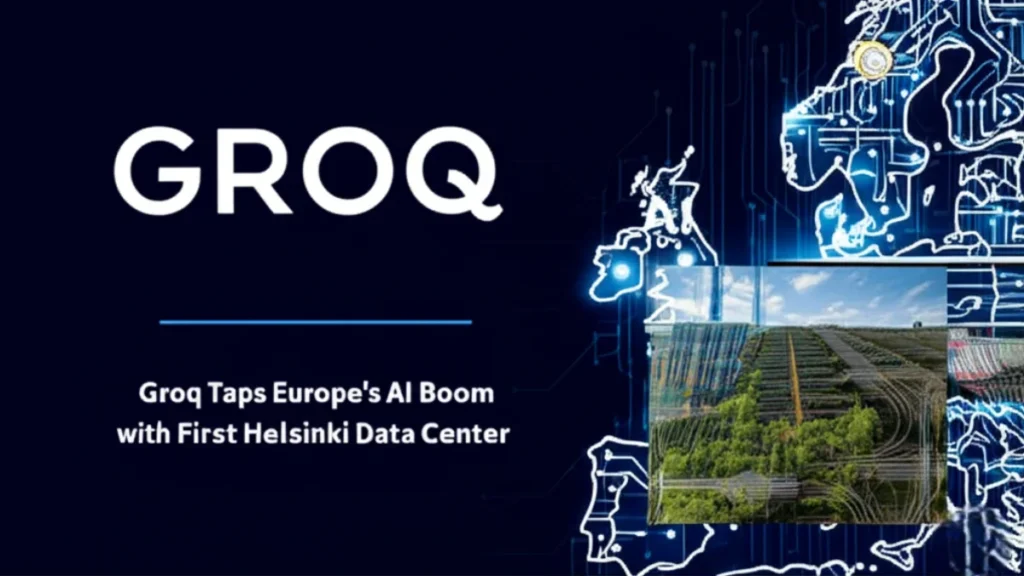Artificial intelligence semiconductor startup Groq is planting its flag in Europe. On Monday, the California-based firm revealed it has launched its very first European data center in Helsinki, Finland, marking a major milestone in its global expansion plan.
The new facility, set up in collaboration with Equinix, comes at a time when demand for AI infrastructure across Europe is skyrocketing. As generative AI sweeps across industries, the need for faster, more efficient data processing and inferencing is pushing companies to build closer to users—and Europe is ready to cash in.
Key Takeaways:
- Groq opens first European data hub in Helsinki with Equinix.
- The chip startup wants to capitalize on Europe’s AI boom.
- Europe’s push for sovereign AI makes local centers vital.
- Groq’s LPUs focus on inference, competing with Nvidia’s GPUs.
- The Nordics attract data centers for clean energy and cool climate.
For Groq, this expansion is more than just another data hall. It’s a clear signal that the AI hardware race is widening—and not every piece of the pie will belong to Nvidia. While Nvidia dominates AI training chips with its powerful GPUs, Groq is betting big on inference, the other side of the AI equation.
So, what exactly does that mean?
In simple terms, AI training teaches large models to “think,” while inference is when the trained model actually “answers.” Think of inference as the brain at work behind your favorite chatbot or image generator. Groq’s custom chip, which it calls a Language Processing Unit (LPU), is purpose-built for this. It’s designed to run AI models in real time, serving up results instantly.
Backed by big names—Samsung’s and Cisco’s venture arms among them—Groq has become one of Silicon Valley’s buzziest AI chip startups. Valued at around $2.8 billion, the company already runs data centers in the U.S., Canada, and Saudi Arabia. Now, with a foothold in Helsinki, it’s setting its sights on Europe’s fast-growing AI market.
But why Finland?
Helsinki and the broader Nordic region are emerging as a sweet spot for data centers. One key reason: green energy. Companies like Groq can tap into abundant renewable resources to power their energy-hungry servers, which is becoming non-negotiable as sustainability concerns rise. The cooler climate also helps naturally cool down servers, lowering operational costs.
Plus, Europe’s political climate is just as important as the weather.
European policymakers have been increasingly vocal about “sovereign AI”—the idea that critical AI infrastructure, including data centers, should reside within Europe’s borders. It’s about data security, faster access for local businesses, and less dependency on infrastructure overseas. Locating the new facility in Finland checks all these boxes.
Equinix, the global data center heavyweight, plays a crucial role here. It’s not just providing the physical space. Equinix connects multiple major cloud providers—Amazon Web Services, Google Cloud, Microsoft Azure—under one roof. That means businesses using Equinix can tap into Groq’s inference chips alongside their existing cloud tools, without major hassle.
This strategy echoes what Nvidia is doing on a larger scale. Just last month, Nvidia’s CEO Jensen Huang made headlines on his European tour, signing infrastructure deals across the continent. The race for Europe’s AI data market is heating up, and Groq wants in.
While Nvidia remains king of AI training, a wave of startups are pushing hard into the inference game—where billions are up for grabs. Companies like SambaNova, Ampere (which SoftBank is acquiring), Cerebras, and Fractile all want a slice of the inference market. But Groq’s approach—dedicated LPUs designed specifically for real-time AI tasks—sets it apart.
For businesses in Europe, Groq’s arrival means faster, more efficient AI services. Having a local data center means lower latency—those few seconds saved when your AI system pulls up an answer can make all the difference. It’s also good news for data privacy, a top concern in the EU.
Europe’s hunger for AI is only growing. From startups to global giants, everyone wants smarter chips, better models, and faster answers. By staking its claim now, Groq is betting that the next wave of AI won’t just be built in the U.S.—it will be run and processed right here in Europe.
For a startup that’s spent years flying under the radar, Groq’s Helsinki move is its clearest signal yet: it’s ready to compete on the global stage.
